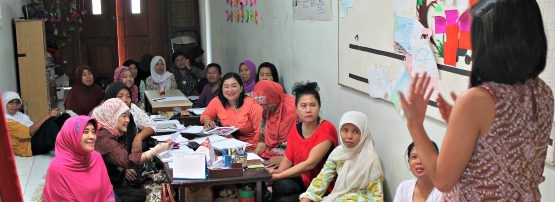
“Good for nothing housewives with nothing to do” is how Sheau Ching Chong, founder of Malaysian social enterprise eHomemakers, felt many people looked at poor, undereducated, home-based female workers. With the innovative use of ICTs, including the newly developed ECHO cloud-based organizational management system, she has radically changed this perception, and many women’s lives at the same time.
In 2012 eHomemakers won an ISIF Asia award for their work. APNIC is a founding partner of ISIF Asia and operates the ISIF Asia Secretariat. Here is Sheau Ching Chong speaking at APRICOT 2014.
The ECHO Project
In 2014, eHomemakers won a follow-up grant from ISIF Asia to support the development of their new project- the ECHO application, which saves non-profit organizations precious staff time and resources, allowing them to increase wages for their workers. The application has just finished successful online training and testing with 300 home-based craftspeople in Indonesia.
ECHO enables organizations to communicate with large groups of people, including the visually impaired, in diverse locations through email and SMS via a centralized database. ECHO sends email and SMS in bulk, as well as auto-summarizing replies with reports.
ECHO technology involves three components:
- An application server (Web server).
- Mobile app causing phones to act as SMS gateways.
- Target recipient’s mobile phones to receive and reply to SMSes.
The mobile app was developed to allow android phones to act as SMS modems and overcome the expense of renting SMS gateways from national telecoms providers, representing a minimal cost to NGOs.
Training and testing of ECHO with HI Indonesia
HomeNet Indonesia (HI) is a national network of NGOs working to address the welfare and socio-economic concerns of home-based workers struggling to earn a livelihood through jobs issued from sub-contractors, middlemen or brokers.
In order for HI to pay a Fair Trade wage to its members, administration, marketing, and procurement of raw materials must be more cost effective; HI have now proven that using ECHO can help them save up to 98% of these costs.
It works like this; an HI business center staff member receives a large Internet order for a product. They then distribute a single work order through an ECHO message to 100 craftspeople. The craftspeople confirm or reject the order. The staff member will then rapidly respond to the customer to accept or decline the order, and initiate production activities. Without ECHO, this process would require costly and inefficient phone calls, one-to-one SMSes, and face-to-face meetings.
One hurdle has been homeworkers resistance to change. For them, calling from a phone kiosk is much faster, albeit more expensive.
In the first phase, 300 out of 10000 HI members were selected to participate in the ECHO training course. Almost all participants recognized the inherent advantages.
The other hurdle faced is Indonesia’s unstable mobile signal coverage, latency in sending and receiving SMSes (5 mins to 12 hours), and an unstable Internet that delays SMS responses. But it is anticipated that Indonesia’s high economic growth will translate into better technology performance.
HI recognizes that more time is required to increase the capacity and habituate the use of ICTs. But positive signs have emerged. The next step is reaching out to the remaining 9700 HI members to help them improve their own lives.
For more information, please visit Homenet Indonesia‘s Flickr page and ECHO program page.
Yeo Lee Chin is the Usability Coordinator (ECHO) at eHomemakers
The views expressed by the authors of this blog are their own and do not necessarily reflect the views of APNIC. Please note a Code of Conduct applies to this blog.

